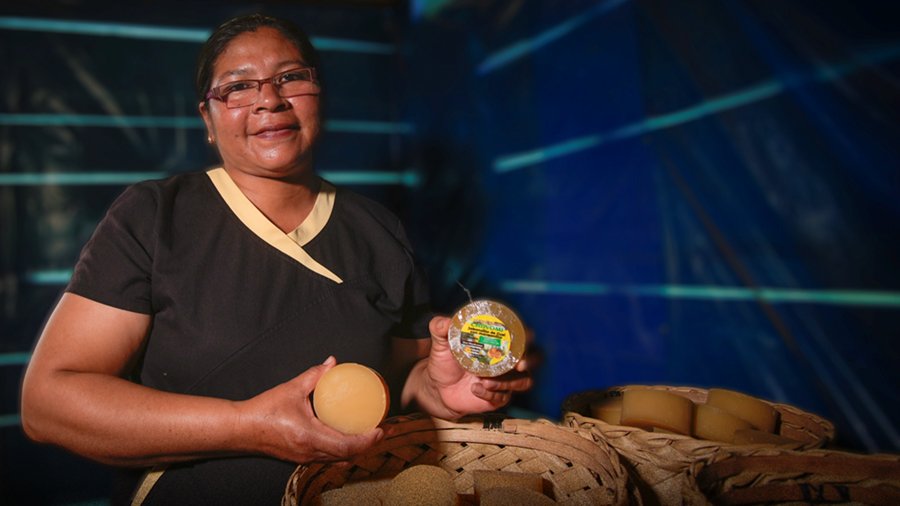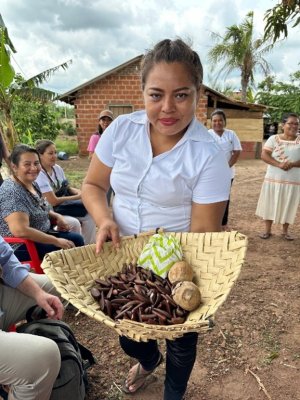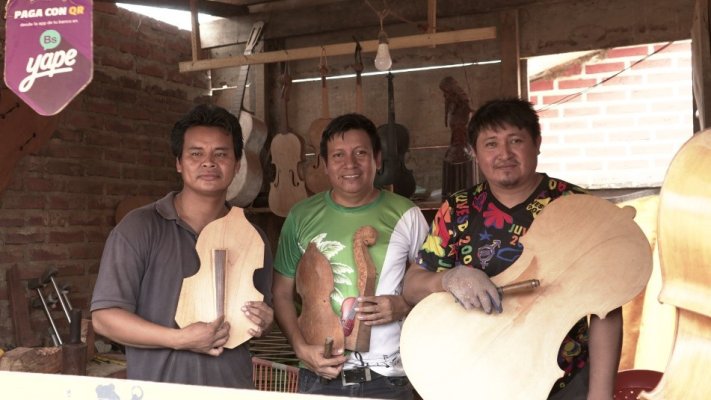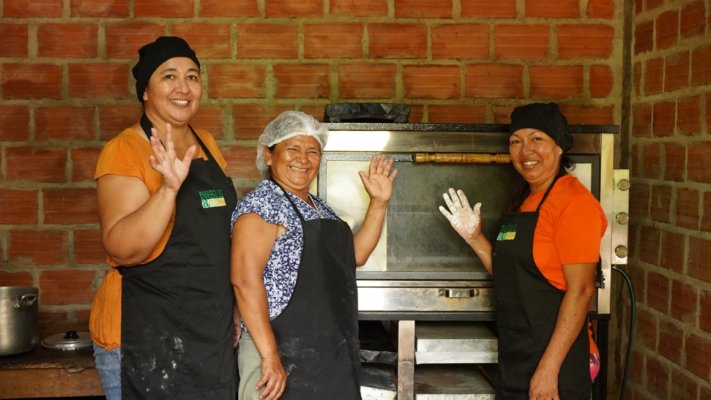Empowering Bolivian bio-businesses to protect the Amazon
 With the support of NDF, the Inter-American Development Bank and Fundación PROFIN, Bartolina Marayai’s business has grown from a family business into an association with positive social and economic impact in her municipality. Photo: Solidar Suisse
With the support of NDF, the Inter-American Development Bank and Fundación PROFIN, Bartolina Marayai’s business has grown from a family business into an association with positive social and economic impact in her municipality. Photo: Solidar Suisse
Since 2014, we have contributed to EcoMicro, which helps conserving the Bolivian Amazon and supports Indigenous communities in protecting the forests in Guarayos while promoting climate resilience.
Indigenous communities and local business owners, living in the Guarayos Province in the north-eastern Department of Santa Cruz in Bolivia, are facing mounting challenges: from climate change to expansion of the agricultural frontier, deforestation caused by livestock farming, land-use change, and recurrent large-scale forest fires, which in 2024 exceeded records from previous years. These factors not only degrade the soil and disrupt ecosystems, but also negatively impact biodiversity, ecosystem services, and local economic activity.
To promote conservation, sustainable development, and a significant reduction in deforestation in the Bolivian Amazon region of Guarayos, NDF, the Inter-American Development Bank’s IDB Lab and Fundación PROFIN, have partnered up to fund a four-year “Bionegócios Initiative.” Since 2021, the initiative has been working alongside Indigenous entrepreneurs to strengthen their companies as ‘bio-businesses’, also known as ‘bionegócios’, which harness biodiversity sustainably to generate economic, social, and environmental benefits. Through seed funding and improvements in financial literacy and sustainable practices, these enterprises are better equipped to succeed, promoting conservation, sustainable development, and a significant reduction in deforestation—all while contributing to the fight against climate change.
One of these bio-businesses is the artisanal enterprise Bartgwagwasu, located in Ascención de Guarayos. The area isoften referred to as the ‘capital of Cusi’ due to the wild palm that is emblematic to the region The business specialises in products derived from Cusi —such as shampoos, soaps, serums, and creams—by extracting oil from the palm’s seeds, a process that does not require cutting down the tree.
With the seed funding, they have been able to invest in materials to streamline production, improving efficiency and saving time, while expanding the product line and transitioning from using firewood ovens to gas, making the production more sustainable.
“Before, we only had one cauldron to make twenty liters of shampoo. Now, we have three cauldrons that allow us to produce sixty liters of shampoo a day,” shares Bartolina Marayai, 42, founder of Bartgwagwasu.
6.9 million hectares affected by fire
The record-breaking forest fires that engulfed the Bolivian Amazon in 2024—most of which occurred in the Santa Cruz Department—have underscored the urgency to protect the region’s forests, biodiversity, and the livelihoods of the communities that depend on them. These events also highlight the critical role of projects like the Bionegócios Initiative, which aims to ensure that Indigenous economies can flourish, particularly in areas facing critical environmental challenges.
“The forest fires and the drought have brought us great sadness because most of the Cusi has burned,” recounts Bartolina.
During 2024, Santa Cruz recorded a burned area of 6.9 million hectares, representing 68% of the total burned area in Bolivia. In Guarayos, forest fires reached over 850,000 hectares out of 2.8 million hectares. The devastating impact of forest fires brought local commercial activities to a near-total shutdown. Although most fires are human-caused, increasingly hot and dry conditions—exacerbated by climate change—have accelerated their spread. While strict mobility restrictions were necessary to protect public health, they further strained the local economy, leaving many businesses unable to function and raising concerns among the population about the risk of future fires.
Luckily for Bartolina’s business, the area where they collect Cusi for their production did not burn, as they know how to take care of it. “But what if it affects us next year? It’s a sad reality, because, for us, the Cusi palm is everything—we use it for our products, our food, even our roofs.”

A member of Bartgwagwasu displays Cusi coconuts and seeds. Photo: NDF
Supporting over 60 bio-businesses through financial literacy
By combining financial literacy, market access, capacity building, and sustainable practices, the project—now in its final year— has supported a total of 62 bio-businesses with seed funding, helping them to achieve their goals, enter new markets, and drive sustainable investments that regenerate the natural environment.
The initiative also provides technical assistance for businesses, workshops and training to equip entrepreneurs with financial skills and sustainable practices, promoting economic autonomy and less dependence on external aid. These workshops cover topics such as digital payment methods, accounting, budgeting, insurance, savings, among other essential financial concepts. Moreover, to ensure understanding and inclusion among Indigenous communities, the trainings are adapted into the native Guarayú language.
As a result, Bartolina was able to invest in the materials needed to streamline production processes, improving efficiency and saving time:
“The training and financial education we have received through Bionegócios has been very helpful in ensuring our business continues to grow,” explains Bartolina.
The Bionegócios Initiative helped Bartgwagwasu triple its average monthly net income, and enabled Bartolina to take her business to the next level: she now has fixed points of sale in Santa Cruz, a product catalogue, and product labels.
“We’ve learned to manage our financial resources, calculate the costs of our products, and even develop ourselves personally through workshops on rights and values.”
Enhancing product quality while protecting forests

Juan Carlos González (first from left), a music professor and luthier, poses with his partners from the Iviriguazu workshop. The company Iviriguazu crafts musical instruments through sustainable wood sourcing. Photo: Solidar Suisse
Juan Carlos González, 33, one of the four partners at Iviriguazu, represents another bio-business supported by the initiative. The company combines artisanal tradition with sustainability in crafting Baroque string instruments, while aiming to ensure that Indigenous economies can thrive, particularly in areas facing critical environmental challenges.
“Through this initiative, we learned that using wood that is legally sourced and is certified as sustainable is better for the environment,” says Juan Carlos.
Training on sustainable wood sourcing has not only improved the quality of their products but has also helped preserve their forests and increase demand for locally produced instruments.
Before joining the Bionegócios Initiative, they lacked a dedicated workshop and modern tools, limiting them to crafting just one violin per month. Now, with a new workshop, specialised equipment and five additional employees, they produce instruments faster—one violin per week—which has increased their monthly income by nearly 50%. They have also expanded their product offerings to include additional instruments, like cellos, double basses, violones, as well as other fine wood carvings, such as altars.
“Musician clients can easily identify the mahogany and cedar wood used for these instruments, and they can tell it comes from this region, not from other countries,” he adds.
LEARN MORE ABOUT ECOMICRO'S IMPACT IN THE REGION
Women thriving with their businesses
Transitioning to sustainable practices protects the forests, improves health, and saves time by reducing harmful smoke from firewood use, lowering disease risks, and freeing up time, allowing the bio-businesses to focus on other activities, and their families—especially for women artisans and entrepreneurs, who often balance business and caregiving.
This was the experience of Lidia Velásquez, a member of Manos Mágicas, a bakery bio-business in the municipality of El Puente.
“Back then, I had to spend an entire day gathering firewood, which would only last three to four days,” shares Lidia. “I also had to knead the dough by hand, which took up to an hour and caused pain in my back and arms. Now, with the kneader, my dough is ready in ten to fifteen minutes, and I don’t even get tired because I just cut the dough balls while the machine does the rest.”
Overall, this has saved Lidia and the other fifteen women in this bio-business an average of three to four hours of production time, allowing them to participate in capacity-building workshops and sustainability training while also increasing their shared monthly earnings by 92%.
“I’ve learned how to integrate oil and flour made from Cusi as a base for all my baked goods. Clients tell me ‘They taste different,’ ‘They look pretty’—but I won’t share the recipe!”

Lidia Velásquez (center) with two associates at the Manos Mágicas kitchen. The name Manos Mágicas translates to “Magic Hands” in Spanish. Photo: Solidar Suisse


